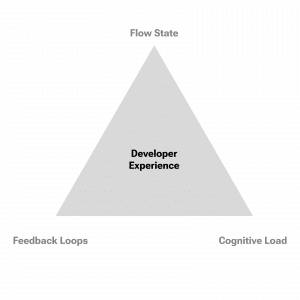Developer experience, or DevEx, is a concept that’s gaining a lot of traction in the software development world.
But why is developer experience so important? How does it directly impact project outcomes? And, more importantly, how can you measure and improve developer experience in your company?
In this guide, we’ll answer these questions and give you some practical tips on how to improve your team’s DevEx. Let’s dive in!
What is Developer Experience (DevEx)?
Think of Developer Experience like a driver’s experience with a car. If the car is comfortable, easy to drive, with intuitive controls and good performance, the journey is much more pleasant and efficient. DevEx is all about making sure developers have tools and processes that make their work as simple, efficient, and even enjoyable as possible.
Developer Experience (DevEx) refers to the quality of experience that software developers have when interacting with products, tools, processes, or technologies throughout the development cycle. This experience can range from the ease of using an API, the clarity of documentation, the quality of development tools, to the efficiency of deployment processes and CI/CD operations.
The goal of optimizing DevEx is to make developers’ work more intuitive, efficient, and even enjoyable. This leads to higher productivity and better-quality software.
Developer Experience Dimensions: Feedback Loops, Cognitive Load, and Flow State
The dimensions of Developer Experience help us understand how different aspects of the work environment directly affect developer productivity and satisfaction. Some key dimensions include feedback loops, cognitive load, and flow state—all of which have a significant impact on the day-to-day work of the team.

Feedback Loops are critical for software development because they provide developers with quick, accurate information about the impact of their actions. The effectiveness of these loops can be measured by how fast developers receive feedback on the code they write, the features they implement, or the bugs they need to fix. Well-structured loops help identify and fix errors quickly, contributing to continuous improvement.
Cognitive Load refers to the amount of mental effort developers need to put into their tasks. Complicated tools, poor documentation, and inefficient processes can unnecessarily increase this load, making it harder to focus on what really matters. That’s why simplifying processes and optimizing tools is key—so developers can channel their energy into creativity and solving complex problems.
Flow State represents those moments of deep focus and engagement, where developers are so immersed in their tasks that they lose track of time. This state is highly desirable because it’s linked to high productivity and satisfaction. Creating an environment that minimizes interruptions and promotes deep immersion is essential for developers to reach this level of focus.
Why is Developer Experience important?
A great DevEx is the foundation for building highly productive, innovative, and satisfied development teams.
Developer Experience is crucial for several reasons, directly impacting team efficiency, innovation, and overall satisfaction. By prioritizing a good experience for developers, organizations can reap significant benefits, such as:
- Increased Productivity: A great DevEx clears away unnecessary tasks and makes daily processes easier, allowing developers to focus on what they do best—creating solutions. Less time spent on repetitive tasks or tool problems means more time for innovation.
- Better Software Quality: When developers have well-configured environments and the right tools, software quality improves. A well-designed DevEx minimizes errors and makes it easier to implement high-quality coding practices.
- Attracting and Retaining Talent: Talented developers want environments that recognize their value and provide optimal conditions for their work. Studies show that companies investing in great DevEx have up to 25% higher retention rates and are more attractive to experienced developers. Exceptional DevEx becomes a competitive advantage, helping to attract and retain top talent.
- Encouraging Innovation: An environment that offers effective support and modern tools fosters creativity and experimentation. Motivated and well-equipped developers are more willing to innovate and contribute to the organization’s progress.
- Positive Engineering Culture: DevEx directly influences engineering culture. Focusing on creating a positive experience fosters a collaborative environment where learning and improvement are highly valued.
Key elements for a good Developer Experience
To ensure a good DevEx, it’s important to focus on elements that reduce friction and enhance developers’ efficiency and satisfaction.
Tools
- Modern, Integrated Development Tools: Tools that integrate well with each other and with the team’s workflow boost productivity and reduce time spent on repetitive tasks.
- Well-Configured Development Environment: An easy-to-configure and replicable environment is crucial. This includes everything from the initial project setup to creating isolated environments for testing.
- Performance and Application Monitoring: Tools that help monitor application performance are essential for maintaining system quality and availability.
- Automating Repetitive Tasks: Automating repetitive tasks—like automated tests, continuous integrations, or even code reviews using AI—frees developers for more critical and creative activities, boosting productivity.
Culture
- Clear, Accessible Documentation: Up-to-date and easy-to-understand documentation is essential. It helps new members onboard and serves as a reference for the entire team.
- Positive and Inclusive Culture: A culture that values diversity and developers’ well-being is key to good DevEx. This includes respecting work-life balance.
- Effective Feedback and Collaboration: An open feedback culture and collaboration are crucial for improving the developer experience.
- Support for Learning and Growth: Offering learning opportunities, like courses and workshops, keeps developers motivated and up-to-date.
Processes
- Code Review Processes: Efficient code reviews ensure quality and promote learning. Automation tools can speed up this process.
- Well-Configured Development Environment: An easy-to-configure environment is vital, from project setup to creating isolated test environments.
- Developer-User Feedback Loop: Establishing a direct feedback channel between developers and end users adds value for continuous improvement and increases team satisfaction by showing the impact of their work.
Common challenges in implementing DevEx
Implementing good Developer Experience (DevEx) involves overcoming various challenges, each requiring specific attention to ensure developers can work effectively, efficiently, and, most importantly, with satisfaction. Here are some common challenges companies face when trying to improve DevEx:
- Identifying Specific Developer Needs: Each team has its own preferences and needs. Understanding these particularities requires constant effort, using surveys and feedback to find what really works.
- Balancing Security and Freedom: Keeping systems secure without limiting developer productivity is a major challenge. Finding the right balance between security and agility takes care.
- Keeping Documentation Up-to-Date: Maintaining current documentation is a constant challenge, but it’s crucial. Outdated documentation usually leads to unnecessary delays and frustrations. It’s essential to create a culture that values this practice daily.
- Scalability: As teams grow, maintaining DevEx quality becomes more complex. Consistency in processes, tools, and documentation must be ensured.
- Promoting a Culture that Values DevEx: Beyond implementing tools and processes, it’s necessary to change the organizational mindset to value developer experience.
Strategies for improving Developer Experience
So, how can we actually improve DevEx? Improving DevEx involves optimizing processes, tools, and company culture. Here are some strategies you can implement:
- Foster a Culture of Open Feedback: Set up communication channels where developers can share feedback on their experiences, challenges, and suggestions for improvement. This helps identify problem areas and creates an inclusive environment where everyone’s contributions are valued.
- Prioritize Automation: Automate repetitive, error-prone tasks like testing, integration, deployment, and environment setup. This allows developers to focus on more strategic and creative activities, boosting both productivity and satisfaction.
- Invest in Modern Tools and Technologies: Regularly evaluate and update the tools your team uses to ensure they are maximizing efficiency and integrating well with existing workflows. Including developers in choosing these tools can improve acceptance and engagement.
- Simplify the Development Environment: Make development environments as simple and standardized as possible by using containers and infrastructure as code, ensuring that all team members can quickly set up their environments without discrepancies.
- Improve Code Review Processes: Optimize code review processes to make them quick, constructive, and educational. Set clear review guidelines, promote positive feedback, and use tools that facilitate collaboration and communication.
- Keep Documentation Up-to-Date: Foster a culture that values documentation as an essential part of the development process. Use tools that make maintaining documentation easier, and incorporate documentation updates as a regular task in the development cycle.
- Promote Professional Development: Provide opportunities for learning and growth, such as courses, workshops, conferences, and time for tech exploration. This keeps the team up to date with the latest trends and practices and increases motivation and talent retention.
- Implement DevOps Practices: Adopt DevOps practices to improve collaboration between development and operations teams, streamline CI/CD processes, and ensure faster, more reliable deliveries. This significantly improves DevEx by minimizing bottlenecks in software integration and delivery.
- Establish DevEx Metrics: Define and track metrics related to DevEx, like environment setup time, deployment frequency, production error rate, and team satisfaction. These metrics help measure the impact of improvement initiatives and identify new focus areas.
- Ensure Work-Life Balance: Recognize the importance of work-life balance and promote practices that support developer well-being, like flexible hours, remote work, and a culture that discourages unplanned overtime.
KPIs for measuring Developer Experience
To effectively measure Developer Experience, it’s important to choose KPIs that are most relevant to your context. A good approach is to start by identifying the biggest challenges the team faces, and then selecting KPIs that help monitor those specific areas. Also, focus on metrics that can be tracked continuously and that provide actionable insights, making it easier to make decisions and improvements.
Here are some useful KPIs:
- Environment Setup Time: Measures the time required for a new developer to be ready to work.
- Deployment Frequency: Assesses how often successful deployments are made.
- Build Success Rate: Measures the proportion of successful builds, indicating the quality of integration processes.
- Time to First Commit: Shows how quickly a new team member can contribute to the project.
- Developer Satisfaction: Satisfaction surveys can provide valuable insights into the overall perception of DevEx.
- Bug Volume After Deployments: Measures code quality by tracking the frequency of bugs after new deployments.
- Average Bug Resolution Time: Evaluates how quickly issues are resolved.
- Code Turnover Rate: Measures the percentage of code that is rewritten or deleted shortly after being written.
- Number of Open vs. Closed Pull Requests: Evaluates the effectiveness of the code review process.
- Engagement with Documentation: Measures the frequency of interactions with project documentation, indicating its usefulness.
Hope this article has helped clarify the importance of Developer Experience and how great DevEx can transform your team’s productivity and satisfaction. If you need help putting these strategies into practice, reach out!



